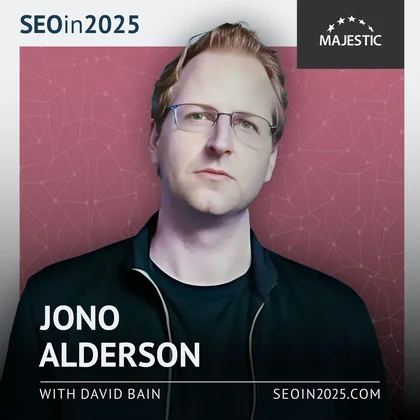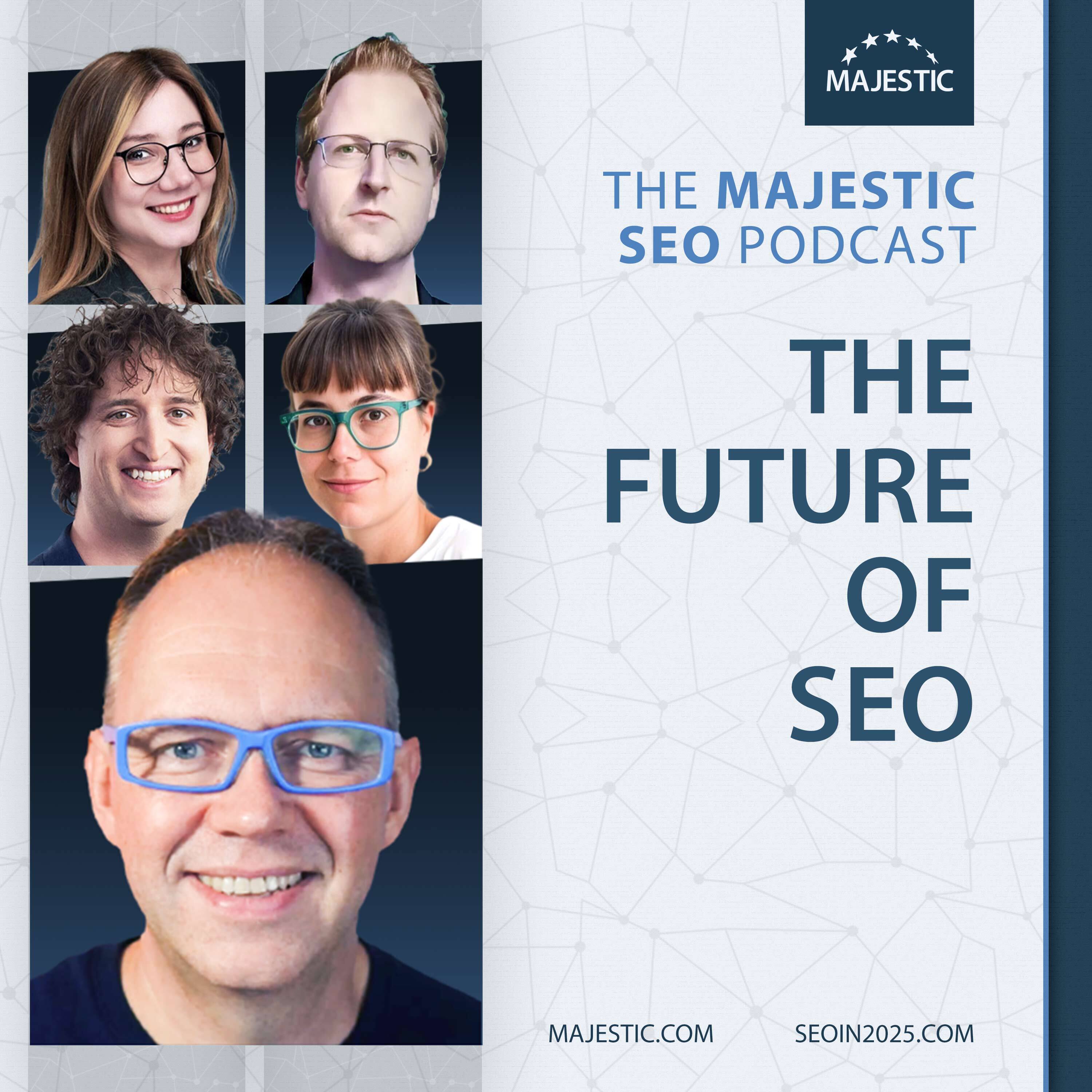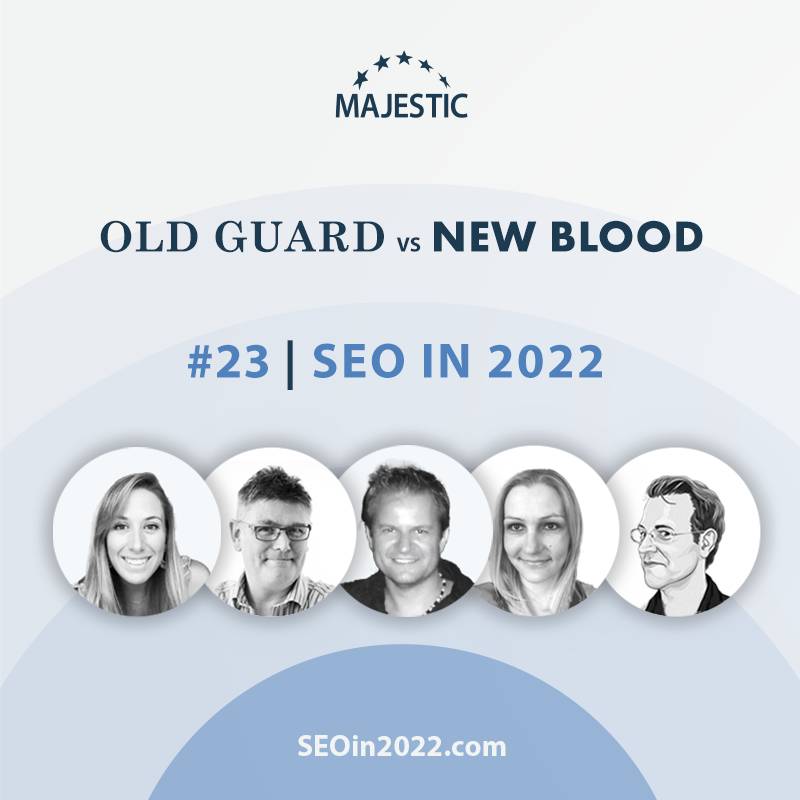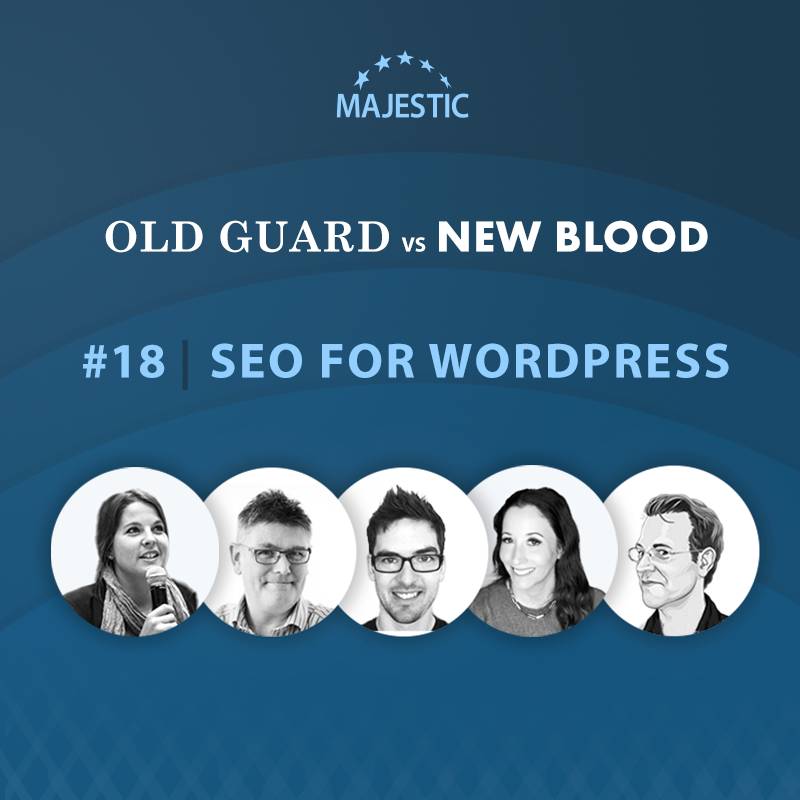-
Site Explorer
- Majestic
- Summary
- Ref Domains
- Backlinks
 New
New Lost
Lost- Context
- Anchor Text
- Pages
- Topics
- Link Graph
- Related Sites
- Advanced Tools
- Author ExplorerBeta
- Summary
- Similar Profiles
- Profile Backlinks
- Attributions
- Compare
-
Link Tools
- My Majestic
- Recent Activity
- Reports
- Campaigns
- Verified Domains
- OpenApps
- API Keys
- Keywords
- Keyword Generator
- Keyword Checker
- Search Explorer
- Link Tools
- Bulk Backlinks
- Neighbourhood Checker
- Submit URLs
- Experimental
- Index Merger
- Link Profile Fight
- Mutual Links
- Solo Links
- PDF Report
- Typo Domain
- Free SEO Tools
- Support
Stop writing articles
Jono Alderson
Taking things in a slightly more dramatic direction, Independent Technical SEO Consultant Jono Alderson thinks that writing articles is no longer an essential piece of the modern SEO puzzle.

Stop writing articles
Jono says: “Stop writing articles. That might come as a shock to many people because it’s one of the things that SEO does, right? But we need to stop assuming that producing content is a fundamental, or even necessary, part of modern SEO.
We need to take a look at what our content marketing strategies and playbooks look like and ask what the role of content and articles are in a world of ChatGPT and AI results, where Google can synthesise answers without needing our input.
That brings up some interesting questions about what we’re doing and what good SEO looks like.”
Isn’t burning our content marketing playbook fairly drastic?
“A lot of us are quietly doing stuff that doesn’t make a tonne of sense anymore. I did a bunch of research, and I looked at dentist websites as an example. Every single site had a really tedious blog, that was quite clearly outsourced to a local agency, with articles about ‘Top 8 tips for Cosmetic Dentistry’, ‘Teeth Whitening’, etc.
If you zoom out, how many dentists are there in the world? Every single one of those websites has the same mediocre article. Somebody has done some keyword research, they’ve spotted a gap, and they think they can write one that’s slightly better than their competitors. In aggregate, we’ve created 10 million pages. None of them serve a purpose, they are all fundamentally the same, none of them are very good, and none of them add new value to the corpus of the internet.
If you’re a search engine with finite resources, and you can increasingly solve problems without needing to ingest new unoriginal content, what’s the point of all those pages?
It’s not just those stale topics, it’s everything. It’s so much of what the SEO industry produces, either because agencies are paid to produce a number of articles every month for a blog or because businesses think that having a blog and writing these pages is a fundamental part of SEO. They’ve been told that if they research the keywords, write the content, and do a better enough job than their competitors, they’ll get some visits and some of those might convert.
All of that stops working when Google can just answer those queries in situ, which is true for any industry or topic where the information is mostly immutable. Recipes are a really good example. There aren’t many new types of foods or ingredients entering the market. Google has enough evidence of every combination of things to solve problems, and even synthesise new answers for new combinations of things.
There’s no value in writing yet another lasagne recipe or yet another article on teeth whitening. These problems are solved, yet so much of what our industry does is continue to solve them over and over again. It’s not valuable and it certainly won’t drive traffic.”
Are we at the stage where SEOs should stop publishing content altogether?
“There’s definitely room to publish good content, and ‘publish’ is a key word. In 2015-ish, everyone started saying that you should become a publisher, and the whole industry misinterpreted that to mean writing lots of articles. Actually, successful publishers do original research with experts. They break news. They visit places. They interact with things.
A lot of what Google’s looking for in the EEAT criteria describes the act of publishing, yet very few SEOs publish. They just produce. If you close that gap, there is definitely value.
In fact, one of the things that Google is looking for (which will be relatively safe from this AI revolution) is websites that publish, move quickly, and produce stuff at greater depth, so that Google can synthesise from it. If you can identify, discover, and create new information and new value, there is always space for that kind of content.
However, there’s no value in producing 4 articles every month, focusing on a given keyword, when all 10,000 of your competitors employ somebody to do the exact same thing.”
How do you critically assess the role of content in a world where Google can synthesise answers to increasingly large numbers of queries?
“It’s really tricky because the kind of content that we’re producing is going to change. ‘8 Tips for X’ with the hope that 2% of that audience converts is not going to work anymore. You’re going to need to go much higher up the funnel, and much earlier into the research cycle.
The role of content will need to change. You’re not trying to convert people who are at the point of purchase but influence what happens next for the people who are at the very start of those journeys.
You can do audience research. Find out what questions people in your sector had 6 months before they purchased, or the frustrations and challenges that they had. What do they wish they’d known when they started those processes?
You can research at scale, you can do the analysis, and you can do conventional research and look at qualitative and quantitative metrics from that side. You can look at things like brand recall and brand preference. This tends to look much more like conventional marketing than it does digital marketing.
There is an increasing belief that attribution is a bit of a pseudo-science and that, as it gets harder to track all these pieces, it becomes increasingly impossible to produce an overarching picture of the influences of all of these pieces. Therefore, you’ve got to go back to conventional marketing. You’ve got to go back to split-testing by locale and doing before and after testing.
You’ve got to look at whether this influences what people think and feel about your brand, your logo, and your recall rather than looking at how many clicks you got out of how many impressions and sales. If you’re trying to compete there, you’re probably too late. You need to be influencing people much higher at the funnel.
Everything we ever learned in the 1950s and 60s about marketing, that’s how we measure what good SEO looks like. We need to step back from some of the more conventional measures.”
Should you try to optimize for bottom-of-funnel keyword phrases first because it is easier to measure conversions and attribution?
“You can try, and using other channels will definitely help that. However, with SEO, it’s going to get harder and harder. You’re going to be competing for an increasingly small pool of people because, if you or your competitors are doing this right, searcher behaviour will change.
Rather than doing 10 woolly searches and eventually picking where to convert, they will do 1 or 2 searches, they have a great experience with the brand, they remember the brand, and they prefer and recall that brand when they’re at the point of purchase. They no longer go to Google and click on all those other sites. To a degree, the bottom of the funnel takes care of itself.
That said, you should definitely make sure that you have a funnel that works and people can and want to check out, etc., but you’re going to be competing with Amazon directly. You’re going to be competing against Google’s own properties. You’re going to be competing in a race to the bottom.
Look at Google Merchant Center’s increasing merge with organic results. The bottom-of-the-slice e-commerce space is going to get so hard to compete in, and so much of it’s going to come down to raw price, delivery times, return policies, etc. It’s going to become super hard to write a page of compelling content about your product that stands out and isn’t going to get cut through. You don’t want to go about it by being the cheapest.”
Do SEOs need to focus more on direct communication and getting people on an email list?
“Definitely. Building an audience is one of the things that SEOs definitely can do, and probably better and more cost-effectively than paid search or other channels. If you’re solving the needs of a broad audience, quite high up the funnel, you can collect a bunch of email addresses from that. You can build that preference and then even market to them in other ways.
SEO gives you permission to access the audience, and then it builds that audience. Other channels are how you push them across the line.
We made a grave mistake around 2017/18, when we started obsessing about the idea that good SEO meant being the last click. We thought we could prove to Google that we were a great result that satisfied the query because people didn’t search afterwards. That’s far too late. We missed a chance to focus on being the first click.
The moment people set out on these research journeys, get in there. Use SEO to capture their interest, win hearts and minds – and also capture their email address and nudge them through other channels. That’s the future – not articles that solve the same problem over and over again.”
Is there a place for having your own blog nowadays?
“Yes, definitely. A huge part of what we see Google looking for in all the recent updates is authentic, human, expert opinions, differences of opinion, and new information. However, the corporate blog is so often an anonymous dumping ground for the kinds of content that don’t fit anywhere else.
Somebody built a website and made product pages, service pages, and an About page. Then, a year later, they got an SEO agency that told them they needed somewhere to put content. You end up with this weird ‘blog’ that’s a mix of outdated company announcements and all sorts. There can be a much better version of that.
Your C-suite can have names and faces and demonstrable expertise. Your SEO strategy might put some budget aside for hiring talent rather than just churning out content. Then, you can really use that as a platform to say something.
That might mean targeting a smaller, more niche audience rather than being broad and inoffensive to everybody but, again, that’s how you win in conventional marketing. You pick those fights and you stand by them.
The best examples where we’ve seen success are with companies that are led by big, opinionated personalities. They use their blogs and platforms to talk about their experiences, their preferences, etc. That works really well – not just in SEO, but more broadly as a way of building a brand. A blog is a way to publish and distribute; it’s not just a place to shout about your press releases.”
If you want to focus on authoritative and original content, can you get any assistance from AI?
“It’s a risk. These tools are trained on the data that’s already out there, and they will continue to be trained on the data that’s being produced – a lot of which is crappy blog articles saying the same thing over and over again. You need to find a way to break out of that.
I would definitely avoid using things like ChatGPT for writing or producing content. You’re just going to get word soup. If you’re very clever with your prompting, you might extract some original ideas, but they’re going to get lost in the noise.
It can be super useful as a writing tool, either for summarising or extrapolating. It’s also quite useful in the research process. If you’ve got access to data, you can upload some spreadsheets and tell it to look at the stock market and the weather patterns, then get it to find you some interesting potential narratives. It’s good for that kind of exploration.
Consider the fact that all of your competitors are going to be throwing their interns at ChatGPT and trying to fill out their blogs at high velocity. A lot of the changes we’re seeing in Google are probably anticipating that future. All of the EEAT and product review stuff is designed to combat a world where there’s an infinite amount of recursive nonsense.
Avoid the temptation to use these tools just to produce. Use them as assistants and muses, to bounce ideas around with, and then do the heavy thinking yourself.”
Can you still come up with a content marketing strategy for the year, or do you have to be more reactive?
“You can still plan, to a degree. You will have a broad understanding of your audience and the kinds of problems they have.
For example, my webcam moves all over the place. At some point, I will get irritated enough to Google that, and the company that produces it should have anticipated that would happen and produced content to solve that problem and recommend the right solutions.
To some degree, you can think broadly about what your pillars and topics are. You can get a feel for things like, if you sell cupcakes, you probably shouldn’t be trying to compete on ‘car engine repair’. You can determine those peripheral fields and how far out you should stray from your core topics. Also, you can consider what kinds of things you shouldn’t have opinions on. Should you be political, for example?
Then, however, you want to reserve a significant amount of headspace for being topical. Again, one of the ways you can compete with the AI swamp is by being faster to market with news and breaking information, and by staying ahead. There will always be a delay in the training sets and the speed with which those systems will know about new stuff, so staying ahead of that curve is useful.
Markets change, preferences change, holidays occur, and global events happen. You don’t want all your content to be news-jacking, but you do want to try and be relevant.
That might be a good place to use AI. You can say, ‘This global trend is occurring, and we’ve launched this new product. Can you take all of that soup and unpick it? Find some interesting narratives, ideas, or science that we might not have come up with. You can also connect it to what your partner brand is doing. Those kinds of synergies are quite easy to discover with AI systems because they’ll spot the patterns, so you can reserve some headspace for that.”
If an SEO is struggling for time, what should they stop doing right now so they can spend more time doing what you suggest in 2025?
“Stop doing everything else. Stop doing all the link building, digital PR, reporting, keyword research, blog posts, directory submission, or whatever you’re doing that isn’t trying to authentically help your audience solve their problems by connecting them with the helpful content you produce and influencing their propensity to prefer you.
Whatever you’re doing that’s not that, isn’t SEO. It’s just an echo of yesterday’s tactics that still just about work.
Whether it’s content, tech, or whatever, we need to spend our time and energy connecting our problem-solving to an audience in a way that generates value for that business. That’s the heart of what SEO is. Drop whatever you’re doing that’s not that, and do that instead.”
Jono Alderson is an Independent Technical SEO Consultant, and you can find him over at JonoAlderson.com.
Also with Jono Alderson
Choose Your Own Learning Style
 Video
Video
If you like to get up-close with your favourite SEO experts, these one-to-one interviews might just be for you.
Watch all of our episodes, FREE, on our dedicated SEO in 2025 playlist.
 Podcast
Podcast
Maybe you are more of a listener than a watcher, or prefer to learn while you commute.
SEO in 2025 is available now via all the usual podcast platforms
Don't miss out
Opt-in to receive email updates.
It's the fastest way to find out more about SEO in 2025.
Could we improve this page for you? Please tell us










